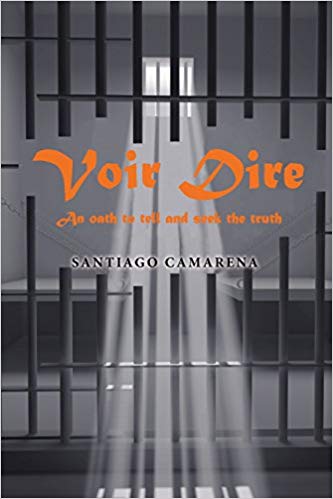 Title: Voir Dire
Title: Voir Dire
Subtitle: An Oath to Tell and Seek the Truth
Author: Santiago Camarena
Publisher: TopLink Publishing, LLC
Pages: 266
Genre: Memoir / Crime
Reviewed by: Jake Bishop
Hollywood Book Review
This is a book from a man whose formal education ended around the seventh grade. Soon after, another education began – an education steeped in crime and punishment – mostly the latter. Much of the author’s life has been spent in prison. That’s where he basically taught himself to write well enough to pen his own story. It’s a story not only about a flawed life, but also a flawed system – a system that too often makes it harder for people who don’t have the financial means or the social status to gain equal justice under the law.
Author Santiago Camarena freely admits he broke laws which resulted in justifiable incarceration, but it is injustice that’s really at the heart of his narrative. The injustice of having to live under deplorable conditions, the injustice of having to suffer both verbal and physical abuse from individuals charged with overseeing the accused and the condemned, plus the terrible injustice of literally being punished for a heinous crime he did not commit.
Camarena’s chronicle takes place in New Mexico in the late 1970’s and throughout the 1980’s. As a Chicano, he was familiar with being treated differently both within and outside the penal system. Prejudice against Hispanics, African Americans, Native Americans, and other minorities was far worse than today. Add the term convict to the above-mentioned, and the mistreatment often rose exponentially. Not surprisingly, prolonged exposure to frequently being treated as less than human can sometimes lead to inhuman behavior. Such behavior exploded in the Santa Fe prison riot of 1980. Camarena covers in explicit detail the violence, maiming, and murder which occurred when prisoners finally revolted. As is often the case, they turned on themselves as well as their guards and the authorities. Violence was rampant. The author did what he could to help negotiate an end to the riot and the enactment of improved conditions for the prisoners. But not before brutality and bloodshed basically overshadowed the very real reasons for the prisoners’ revolt.
The largest section of the book is taken up with Camarena’s arrest, conviction, and subsequent multiple trials for the murder of an Albuquerque police officer. The author maintains his innocence now as he did then. But that didn’t stop the authorities and the judicial system from railroading him. Camarena goes into copious detail as he recounts conflicting eyewitness accounts, irregular police procedures, specific trial testimony, overt bias often brought on by sensational media reporting, and more.
Overall, Voir Dire is a book written by a man who has spent far too much of his life behind bars. It is in essence a cautionary tale. Certainly it reminds readers that crime does not pay. But it makes an even stronger point that justice applied unequally can never be justice at all.
